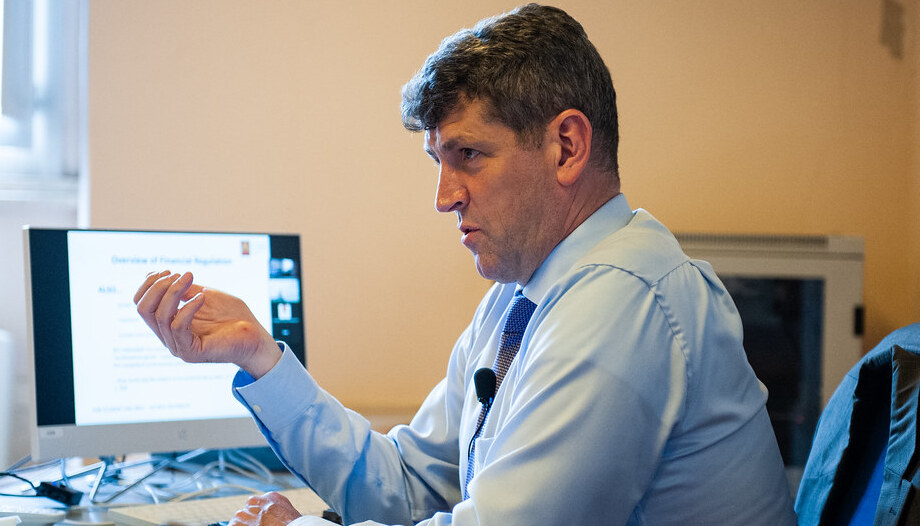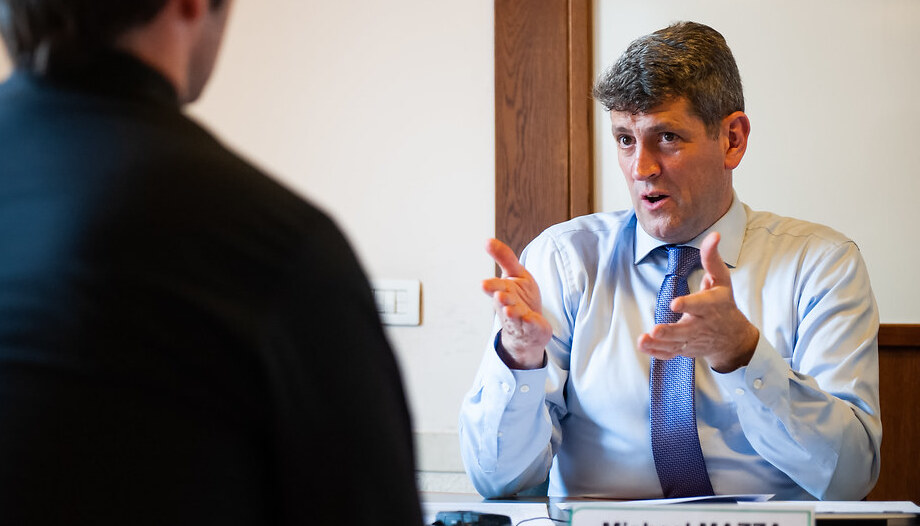Translation of the article into English
"Men of Melchizedek" (MOM) is a North American organization that provides spiritual and material support to priests in difficulty. In the summer of 2021 a religious order asked him if he could develop a model for dealing with accusations of sexual abuse. It was then that MOM's managers decided to create a legal office specializing in these matters. As this is a matter of the utmost importance, they were interested in developing a protocol that would guarantee a rigorous investigation and respect the presumption of innocence of the accused. The aim is to work together to ensure that the truth about a given accusation is actually found.
Michael Mazza is the legal advisor of this institution. He recently defended his doctoral thesis at the Pontifical University of the Holy Cross (Rome) on the right to reputation of priests, with particular attention to those accused of abuse. On this occasion, we chatted with him about the challenges of these criminal proceedings in the Church.
How did the idea of creating an office to treat accused priests come about?
-Faced with the increase in the number of trials in the Church against priests and the various situations that arise, I thought that the right to the presumption of innocence and the right to legitimate defense should be guaranteed. It is these rights, which are fundamental for judicial processes to be truly fair, that I intend to serve with my work.
To what extent is the presumption of innocence of priests at risk?
-The media attention that many of these trials receive can sometimes undermine the due process rights of the accused. No one is in favor of impunity; but neither should we be in favor of convicting someone without due process. It seems to me that in recent years we have gone from one extreme to the other. It is worth not forgetting, as one of my canon law professors used to say, that the symbol of justice is not a pendulum, but a balance.
What did you do before opening the law office?
-After finishing my studies, I worked as a teacher and catechist for ten years. Then, when our family began to grow, I decided to study civil law and work as a lawyer, a job to which I have dedicated myself for two decades. Since July 16, 2021, the feast of Our Lady of Mount Carmel, I have started counseling in the new office. I believe that Mary, as Mother of Priests, is an especially important intercessor for this type of work.
The search for and determination of that truth undoubtedly helps victims to obtain reparations.
Michael Mazza. Legal Advisor Men of Melchizedek
In your opinion, how has the Church handled abuse cases in the United States?
-It is a pertinent question, and a very complex one. The first thing to point out is that there have been many victims of sexual abuse, whose suffering is indescribable. The damage they have suffered is incalculable. The passivity of the ecclesiastical authorities in punishing and correcting such conduct has generated a very great scandal.
All this leads us to conclude that the hierarchy did not act well. I think few would disagree with this. Without detracting from the above statement, I would like to point out that many lawyers and psychologists who advised the bishops considered that those responsible for these abuses, rather than criminals, were simply sick people, in need of treatment and healing. Without excusing the responsibility of the bishops, these approaches may help to understand the lack of forcefulness with which they often reacted to the allegations.
Has the situation improved today?
-The situation has certainly improved. First of all, accusations are taken more seriously. Second, civil authorities are getting involved more often. Finally, and most importantly, the needs of those harmed by abuses tend to come to the forefront. In any case, this overall picture also presents certain shadows or challenges. On the one hand, the ease with which accusations can be received can lead to imbalances, such as the fact that anonymous complaints are used as an instrument in the service of private vendettas. The involvement of civil authorities can sometimes cause other problems, especially if the authority is actively hostile to the Church. Finally, it has not been uncommon for the needs of victims to be presented in purely monetary terms.
Of all these challenges, which do you consider the most pressing?
-I think the main challenge is to ensure a fair trial for accused clerics. This perception is what led me to investigate this issue and to focus my professional work there.

Could you list some aspects that could be improved in the processes?
-As I have already mentioned, it is particularly important to protect the right to defense and the presumption of innocence. Along with these, it is also necessary to ensure the good name of the defendant, whose honor should not be harmed until proven guilty.
Publishing the names of the accused before they are convicted in any kind of judicial or even extrajudicial process is a horrible abuse, and creates irreparable harm. If there is a single fruit of my research and publication, I hope it will be the elimination from those lists of so-called "credible defendants."
How does your study help to combat sexual abuse in the Church?
-One idea that runs throughout my research is the importance of getting to the truth about a particular allegation. The search for and determination of that truth undoubtedly helps victims to obtain redress. The statement sometimes heard of "all allegations must be believed" is populist, and can be insulting to the real victims, including those who are falsely accused, those who have suffered real harm.
Do you have any suggestions on how the process against clergy accused of abuse could be improved?
-I could mention many. These are simple measures, nothing revolutionary. Among others, I can mention the need for better training of the persons called to form the canonical tribunals; better communication to the clergy of their rights in the process; and better legal assistance to the accused, who - like any other person - have the right to a qualified defense.
A more detailed discussion of these and other measures can be found in a document that I have contributed to, which is available at website of the association "Men of Melchizedek"..
You have recently defended a doctoral thesis entitled "The Right of a Cleric to Bona Fama". Why were you particularly interested in this aspect?
-Starting from the idea that justice consists in giving to another a good that corresponds to him, I wanted to focus on the good consisting in reputation, in the good name. This juridical good is particularly important with regard to the ordained clergy, because of the position of service they occupy in a community of the faithful.
Throughout my research, I seek to explain what reputation is, why it is important, how it has been protected throughout history in many different cultures, and finally, what this means in the contemporary context, especially in the United States.
Why is it important to have a canonical advisor?
-Allegations of sexual abuse are criminal in nature and often involve the initiation of a prosecution that can have very serious consequences. The accusation of a crime is therefore a very serious matter. To deal with it, technical legal expertise is required, which most of the time a priest does not have. Along with this, a canonical advisor can provide perspective, encouragement and a listening ear to people going through such processes.
Does your canonical advice cover only cases of abuse within the Church?
-The vast majority of my clients, I would say two thirds, are involved in abuse proceedings. Along with this, I also advise on other types of proceedings, such as marriage annulment cases.
Do you select your customers?
-Of course. I feel I have an ethical duty to make sure I can represent them well, so if I lack the time or specific preparation needed for a matter, I prefer to refer those clients to other colleagues. In addition, before formalizing the relationship it is appropriate to ensure mutual understanding, as well as that the client shares my approach to the process, which is a straightforward and always respectful approach to the bishop's office.
Some consider that the supernatural character of the Church exempts the hierarchy from respecting the natural rights of the accused.
Michael Mazza.Legal Advisor Men of Melchizedek
Could you briefly explain how the process against a clergyman accused of abuse unfolds?
-Gladly. Once a superior receives an accusation of abuse, at least in the United States, in the vast majority of cases the accused is immediately relieved of his duties. Often he is also asked to leave the premises, forbidden to celebrate the sacraments publicly, urged not to dress as a cleric, and ordered not to present himself publicly as a priest. He is also frequently ordered to a psychological hospital, where he may be placed in complete isolation, made to sign a waiver of confidentiality and subjected to lie detector tests. It is common for him to be interrogated by a diocesan investigator or instructor, without even being informed of his civil and canonical rights. In short, an allegation of abuse is the beginning of a long nightmare for the accused.
Without getting bogged down in technicalities, it is worth noting that the procedure for punishing crimes in the Church, at least through administrative channels, is often not very protective of the rights of the accused.
As Professor Joaquín Llobell denounced years ago, it seems that some consider that the supernatural character of the Church exempts the hierarchy from respecting the natural rights of the accused. In this way the door is opened to all abuse, and the Church, instead of being a "mirror of justice" becomes for the accused a broken and dangerous mirror. With this criticism I do not intend to justify the situation of impunity that has existed for years, but to underline that it is also unjust to go the other way, depriving the accused of the necessary means to prove their innocence.
Have your activities been well received by the U.S. bishops and the Congregation for the Doctrine of the Faith?
-There is no generalized answer to this question. Some bishops are sympathetic to the situation of the accused priest and try to help him. In this case, my services are usually valued and, without compromising their neutrality, a healthy collaboration is established between the authorities and our office, like the one that can exist between a civil court and a law firm.
In other cases, unfortunately, the bishops totally disassociate themselves from the accused. Perhaps this behavior is due to the enormous media pressure that surrounds these proceedings in the United States, as well as to the advice of some lawyers who think that this behavior is the "safest" one, in order to avoid giving the impression of implicit support to possible abusers.
Are there other law firms similar to yours?
-Very few. The majority of civil lawyers who dedicate themselves to these matters usually work directly for the dioceses. Personally, I trust that progressively more professionals with good civil and canonical training will dedicate themselves to these matters with a constructive and communion attitude, which could be summarized in the expression "sentire cum Ecclesia".
What scenario would you like to see in the near future?
-I pray that God will give comfort and strength to the people involved in these processes. I am referring both to the people who have suffered abuse and to the falsely accused priests who feel abandoned. I hope that the Lord will give strength to the bishops, who bear a great responsibility and are besieged from all sides. I pray that he will encourage and sustain the desire for justice of all those who work in the diocesan tribunals.








